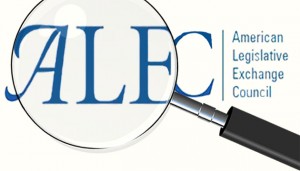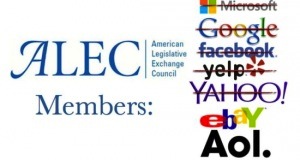 Washington – The midterm elections may have given the embattled American Legislative Exchange Council a new lease on life.
Washington – The midterm elections may have given the embattled American Legislative Exchange Council a new lease on life.
ALEC has been bleeding corporate members, but with Republicans now in control of 68 out of 98 state legislative bodies, there are fewer impediments to the enactment of the corporate-friendly legislation that ALEC peddles – and in early December, ALEC and the corporations that still fund it will likely lay out the legislative blueprint for 2015 at the ALEC States & Nation Policy Summit in Washington, DC.
HISTORIC RESULT
“Prior to the sweeping change witnessed in 2010, one must look back to 1896 to see such a momentous shift in leadership at the federal, state and local levels,” wrote ALEC Executive Director Lisa B. Nelson in a November 5 email to ALEC members.
Republicans expanded their majorities in many states, took control of 11 legislative chambers that had been held by Democrats, and gained three governorships. She claimed the election results were “a historic victory for limited government, free markets and federalism.”
UNPOPULAR POLICIES
Yet, the actual policy ideas that ALEC promotes are less popular than ever. Republican and Democratic voters across the country voted overwhelmingly in favor of increasing the minimum wage on election day – which ALEC and ALEC funders like the National Restaurant Association have long opposed – and not surprisingly, a top agenda item at ALEC’s December meeting is aimed at thwarting efforts to raise the wage.
BLOCKING WAGE INCREASES
 Citizens in red states like Alaska, Arkansas, Nebraska and South Dakota voted overwhelmingly in favor of raising their state’s minimum wage on November 4, as did Republican and Democratic voters in states like Wisconsin, where twenty communities supported advisory referendums in favor of raising the wage.
Citizens in red states like Alaska, Arkansas, Nebraska and South Dakota voted overwhelmingly in favor of raising their state’s minimum wage on November 4, as did Republican and Democratic voters in states like Wisconsin, where twenty communities supported advisory referendums in favor of raising the wage.
With such a clear divide between the policies that voters support and those that ALEC corporate interests like the National Restaurant Association (which has been fighting for a $2.13 sub-minimum wage) want legislators to implement, the Commerce, Insurance, and Economic Development Task Force will feature a presentation on “Minimum Wage Preemption Policies.”
‘LIVING WAGE PREEMPTION’
 ALEC has long pushed bills like the “Living Wage Preemption Act” to block city, county, or local governments from enacting progressive economic initiatives like a higher minimum wage.
ALEC has long pushed bills like the “Living Wage Preemption Act” to block city, county, or local governments from enacting progressive economic initiatives like a higher minimum wage.
In light of the renewed grassroots push for fair wage laws, this bill to crush a local government’s ability to increase wages in their community will likely be a top ALEC priority in 2015. (ALEC legislators have also been active in banning local paid sick day efforts, passing 10 laws after Wisconsin’s paid sick days preemption bill was shared at ALEC’s August 2011 meeting).
ATTACKS AT LOCAL LEVEL
 Running parallel to the ALEC summit is the second meeting of the American City County Exchange (ACCE), the new ALEC offshoot aimed at pushing corporate-friendly legislation directly at the local level.
Running parallel to the ALEC summit is the second meeting of the American City County Exchange (ACCE), the new ALEC offshoot aimed at pushing corporate-friendly legislation directly at the local level.
It presents an interesting contrast: as ALEC members discuss how to thwart local governance through minimum wage preemption policies, ALEC is trying to make inroads into local government.
An early agenda for the ACCE meeting shows that one workshop is titled “Local Minimum Wage: a defense for small business and their employees.”
LOCAL RTW
The ACCE meeting will also feature a presentation titled “Local Right to Work: Protect my Paycheck.”
ALEC has long pushed anti-union “Right-to-Work” laws, which allow non-union members to free-ride on union representation, reaping the benefits of union negotiations for wages and benefits but without paying the costs. Michigan’s right to work law, for example, was a word-for-word copy of ALEC’s model legislation and sponsored by ALEC members.
With ACCE, ALEC is now trying to promote this anti-union legislation at the local level.
ULTIMATE GOAL: U.S. SUPREME COURT
 In September, the Washington Examiner reported that “Conservatives are starting to push the idea that city and county governments can pass union-restricting right-to-work laws, even though it may not be legal and has been tried only a handful of times in the last 70 years.”
In September, the Washington Examiner reported that “Conservatives are starting to push the idea that city and county governments can pass union-restricting right-to-work laws, even though it may not be legal and has been tried only a handful of times in the last 70 years.”
It is unclear whether local governments have the authority to pass right to work under the Taft-Hartley National Labor Relations Act, but in August the Heritage Foundation issued a report arguing that they do.
Heritage hosted a panel discussion on local right-to-work in August featuring representatives of ACCE, Grover Norquist’s Americans for Tax Reform, and the National Right to Work Legal Foundation, and highlighted what they viewed as opportunities for local ordinances in Kentucky, Ohio, and Pennsylvania.
Earlier this year, the Freedom Foundation (a State Policy Network affiliate and ALEC member) promoted local right to work ballot initiatives in three cities in Washington State, all of which failed. Newly-elected local officials in Kentucky have announced plans to push local right to work laws in 2015.
Given the legal uncertainty around local right to work, any local government that enacts this anti-union legislation would certainly face costly legal challenges. Yet this may be ACCE’s goal: to set up a lawsuit that can be appealed to a friendly U.S. Supreme Court.
STATE EFFORTS
Right-to-work may also gain new momentum on the state level.
In New Mexico, for instance, where Republicans gained control of the Assembly for the first time in 60 years, ALEC members like Sen. Stuart Ingle are calling for the state to pass right to work legislation.
DEPRIVING HEALTH INSURANCE
 The ALEC Health and Human Service Task Force will discuss the “Medicaid Anti-Crowd-Out Act,” which would prohibit people from enrolling in Medicaid if their employer offers some form of insurance, regardless of how poor the person might be or how much the plan costs.
The ALEC Health and Human Service Task Force will discuss the “Medicaid Anti-Crowd-Out Act,” which would prohibit people from enrolling in Medicaid if their employer offers some form of insurance, regardless of how poor the person might be or how much the plan costs.
When combined with the latest Affordable Care Act challenge to reach the U.S. Supreme Court – which ALEC has helped advance – this proposal can only be called cruel.
On November 7, the Court granted review of the case King v. Burwell, which argues that the ACA should be read as prohibiting insurance premium subsidies for low-income citizens in states that refused to set up their own online healthcare exchanges, a reading contrary to the clear intent of the law’s drafters and to a reading of the law as a whole.
If the King lawsuit is successful, then low-income citizens of the 26 states that refused – many at ALEC’s urging – to set up state-run exchanges would be ineligible for the subsidies that make insurance affordable.
And in states that pass the ALEC “Medicaid Anti-Crowd-Out Act,” those same low-income Americans – who cannot afford insurance because the subsidies are unavailable – would be prohibited from enrolling in Medicaid.
On the one hand, ALEC is working to eliminate the subsidies that would make that private health insurance affordable for the working poor. And on the other, ALEC is declaring that those same people are ineligible for Medicaid.
‘SHAREHOLDER ACTIVISM’
 Although ALEC will come into its December meeting buoyed by the opportunities presented by November’s election results, dark clouds will be hanging over the festivities.
Although ALEC will come into its December meeting buoyed by the opportunities presented by November’s election results, dark clouds will be hanging over the festivities.
Throughout the fall, ALEC suffered an exodus of high-profile tech industry members, including Google, Microsoft, Yelp!, Yahoo, and AOL, which separated themselves from the organization over its climate change denialism and efforts to crush renewable energy.
And, at the beginning of November, SAP America parted ways with ALEC, a particularly crushing loss since the software giant chaired ALEC’s private enterprise board.
Since the Center for Media and Democracy launched ALECexposed.org in 2011, over 90 companies have dropped their ALEC membership.
As a result of its dwindling list of corporate funders, ALEC closed 2013 with a nearly $1.2 million deficit.
Socially-conscious investors like Walden Asset Management and faith-oriented investors like the Unitarian Universalists have played an important role in getting companies to disclose their ALEC membership or leave ALEC altogether, and this apparently has ALEC spooked. In one recent fundraising email ALEC attacked the Unitarian Universalist Church as “professional activists.”
Accordingly, the ALEC Civil Justice Task Force will consider a presentation on “The Onslaught of Shareholder Activism and Its Implications” at the December meeting.
(Reprinted from the Center for Media and Democracy’s PRWatch.)

